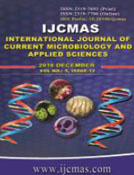


 National Academy of Agricultural Sciences (NAAS)
National Academy of Agricultural Sciences (NAAS)

|
PRINT ISSN : 2319-7692
Online ISSN : 2319-7706 Issues : 12 per year Publisher : Excellent Publishers Email : editorijcmas@gmail.com / submit@ijcmas.com Editor-in-chief: Dr.M.Prakash Index Copernicus ICV 2018: 95.39 NAAS RATING 2020: 5.38 |
Production of snap beans is constrained by diseases that make farmers use synthetic pesticides excessively. Use of synthetic pesticides leads to contamination of produce, threat to beneficial organisms and pollutes the environment. Microbial pesticides are eco-friendly, target-pest specific, biodegradable and safe hence alternative to synthetic pesticides. In vitro studies were conducted to evaluate the antifungal activity of microorganisms isolated from local environment. Test plant pathogens were isolated from diseased tissues and antifungal activity of the microbial antagonists evaluated against species of Fusarium, Colletotrichum, Alternaria and Rhizoctonia using the dual culture method. Growth inhibition was determined as reduction in plant pathogen colony diameter. A total of 42 microbial isolates were found to possess antimicrobial activity out of which 16 were most active. The most efficacious antagonists were identified as Trichoderma viride, T. harzanium, T. asperellum and Paecilomyces. T. harzianum was the most active and inhibited the test pathogens by up to 66%. The results indicated that local soils, rhizosphere and dead organic substrates are potential sources of microbial antagonists that can be exploited. These microbial biopesticides would serve as alternatives to synthetic pesticides in management of diseases in snap beans.
 |
 |
 |
 |
 |